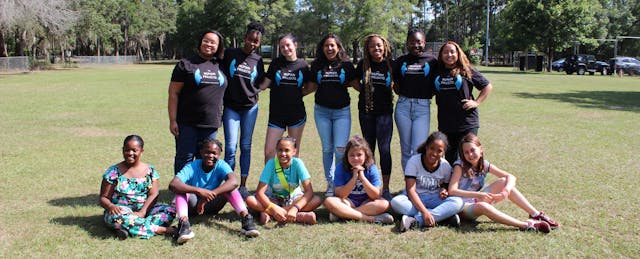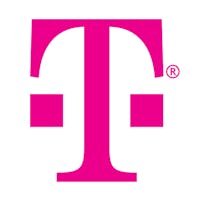When Alexandria Brady-Mine walked into her junior year Advanced Placement exam her jaw dropped. There were more than 200 high schoolers there to take the exam, but only two students were black and she was one of them. The scene was a stark reminder of the significant achievement gap between white and black students in her community of Alachua County, Florida.
Her heart sank that day, but her determination to be a changemaker soared.
A lifetime of similar experiences had already led Brady-Mine to become a volunteer, activist, speaker, and CEO of The Human Projects, a global youth run nonprofit that helps students address human rights issues in their own communities.
But the AP experience told her she needed to do more. So she submitted an application and became one of the 30 winners of last year's first-ever T-Mobile Changemaker Challenge, a national contest that helps students aged 13-23 create or grow projects that promote impactful, sustainable changes in their communities.
With this year’s challenge having one category focused on improving education, Brady-Mine wants to encourage every student with a passion for helping others take part in it.
Here she shares all she gained from participating in the T-Mobile Changemaker Challenge along with tips and advice for students who want to take part in this year’s challenge. She also shares the one simple step educators can take to encourage students to become changemakers in their communities.
Tell us about your winning project?
My submission was "Standing Tall," a service-learning program focused on empowering minority and low-income changemakers.
In my community, we have a significant achievement gap between black and white students. I noticed most programs strictly focused on getting students to pass classes. There weren't many programs thinking about, "How can we get them to pass classes and be prepared to enter the workforce or go to college?"
My program was designed to give students real-world experience with entrepreneurial skills. Something they can put on their college application and say, "I led this community cause, and it helped this many people in our community."
We submitted the idea to the T-Mobile Changemaker Challenge in 2018, and with the experience we gained, we were able to launch the program in the Spring of 2019.
Students in our program created projects that ranged from providing menstrual hygiene products to homeless women and school supplies to low-income students to raising awareness of modern slavery and human rights issues. Each student was paired with a university student mentor for six weeks to receive academic and career guidance.
Students learned entrepreneurial skills such as communication, budgeting, leadership, teamwork, and responsibility. Their projects directly impacted over a thousand people in our community.
This year we've changed the name of our program from Standing Tall to Young Human Rights Changemakers and made it an international program. So far, we've received 195 applications from educators in 45 countries. I run the program through my nonprofit organization, The Human Projects.

What did you learn from the T-Mobile Changemaker Challenge?
The Changemaker Challenge was a crash course in everything you need to know to take an idea, turn it into a program, and then grow it exponentially. The application process really pushed us to think through a step-by-step plan for our program. The plan changed quite a bit, but that process helped us solidify our idea.
Fundraising was a major issue for us in the beginning. But with the skills we learned, we were able to get funding from several companies and organizations, including the Jane Goodall Institute for the Fund II Foundation.
The other Changemaker Challenge winners were also an incredible resource that I still use a lot. They share grants we can apply to and contacts who can help us spread the word about our program. I still talk with them about issues they're having and how we can grow our organizations further.
What advice would you give to other students who might be interested in the T-Mobile Changemaker Challenge?
I would say dive into what makes you a changemaker, It doesn't have to be something huge like starting a nonprofit or a program. It's just any way that you're working to make the world a better place. Because no matter how young you are, you have this incredible capacity to create change in your community.
Even something simple like planting a butterfly garden, running a food supply drive, or donating your clothes to help someone who's in need.
And the second is something I learned in a workshop we took through the Changemaker Challenge--learn to tell your story. Both the story of you the changemaker and the story of the program you're trying to build. When we began, our story was a bunch of statistics and saying, "Here is the problem, and this is why we need to fix it." But after that workshop, we started incorporating our stories. We talk about how I went to a school where I was the only black student and how there wasn't much racial diversity as I continued throughout school.
Putting in those personal details made the story more real than just listing statistics. Numbers are too abstract to fund.
What do you think educators can do to encourage students to become changemakers?
Think about and look at young people in a positive way that makes them think they can change the world. When I started running my first community project, I was very young and got a lot of pushback. People didn't think I could do it or even that I should be trying to do it. But that changes when you have just one adult in your life who says, "You can do this. I'm going to support you. I'm going to help you find the things you need to make this happen." That's really all it takes.
For me, that was my parents. When I was in elementary school, I learned there were students my age in classrooms all over the county who didn't have access to books, particularly books with minority characters or stories about different cultures. My first volunteer project was to go around to these schools with my mom. We would read stories about different cultures and people who were not the typical people you would see in books that were being shown to the class.
What was it like to meet other students who are passionate about helping others?
It was really energizing to be around so many people who got it. I do this because of the incredible feeling I get and because I feel a responsibility to make the world a better place. We’re growing up in a world where the issues are very clear, but the solutions are not. But with the Internet we have more tools. We have a better understanding of where there are global issues and how we can make a difference, whether it's by starting a nonprofit or signing an online petition. I Googled how to start a nonprofit! That's how I figured stuff out.
The Changemaker Challenge showed me there are a lot of people trying to create solutions and there are ways to create change.



